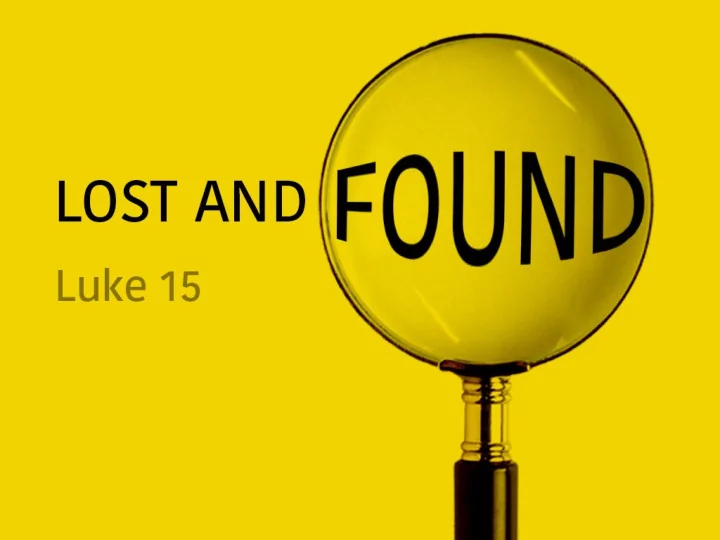

Luke 15 - “The gospel in the gospel” 1 Now the tax collectors and sinners were all drawing near to hear him. 2 And the Pharisees and the scribes grumbled, saying, “This man receives sinners and eats with them.” 3 So he told them this parable:
Luke — Jesus and the excluded ones: a) the poor and oppressed b) tax collectors and sinners (Zacchaeus) c) women (Mary) d) the samaritans (the good samaritan) e) the sick
Luke 15 - “The gospel in the gospel” 1 Now the tax collectors and sinners were all drawing near to hear him. 2 And the Pharisees and the scribes grumbled, saying, “This man receives sinners and eats with them.” 3 So he told them this parable:
The Pharisees gave to people who did not keep the law a general classi fj cation. They called them the People of the Land; and there was a complete barrier between the Pharisees and the People of the Land. To marry a daughter to one of them was like exposing her bound and helpless to a lion. The Pharisaic regulations laid it down, "When a man is one of the People of the Land, entrust no money to him, take no testimony from him. Trust him with no secret, do not appoint him guardian of an orphan, do not make him the custodian of charitable funds, do not accompany him on a journey." — William Barclay
A Pharisee was forbidden to be the guest of any such man or to have him as his guest. He was even forbidden, so far as it was possible, to have any business dealings with him. It was the deliberate Pharisaic aim to avoid every contact with the people who did not observe the petty details of the law. — William Barclay And the Pharisees and the scribes GRUMBLED , saying, “ This man receives sinners and eats with them .” (v.2)
Luke 15 3 So he told them this parable : pharisees and the scribes 3 stories | 1 parable
The fj rst story (vs.4-7) 4 “What man of you, having a hundred sheep, if he has lost one of them, does not leave the ninety-nine in the open country, and go after the one that is lost, until he fj nds it? 5 And when he has found it, he lays it on his shoulders, rejoicing.
The fj rst story (vs.4-7) 6 And when he comes home, he calls together his friends and his neighbours, saying to them, ‘Rejoice with me, for I have found my sheep that was lost.’ 7 Just so, I tell you, there will be more joy in heaven over one sinner who repents than over ninety-nine righteous persons who need no repentance.
The second story (vs.8-10) 8 “Or what woman, having ten silver coins, if she loses one coin, does not light a lamp and sweep the house and seek diligently until she fj nds it? 9 And when she has found it, she calls together her friends and neighbours, saying, ‘Rejoice with me, for I have found the coin that I had lost.’ 10 Just so, I tell you, there is joy before the angels of God over one sinner who repents.”
A) Similarities: ‣ Something is lost (sheep/coin) ‣ The owner seeks until he/she fj nds it ‣ When the owner fj nds what was lost, he/she “calls together his friends and his neighbours, saying to them, ‘Rejoice with me’ “ (v.6,9) DON’T FORGET: This was addressed to the Pharisees
What is Jesus teaching here? The lost’s The seeker’s perspective perspective This is not about the sheep or the coin This is about GOD
What is Jesus teaching here? Do I take any pleasure in the death of the wicked? declares the Sovereign LORD. Rather, am I not pleased when they turn from their ways and live? Ezekiel 18.23 [God] wants all men to be saved and to come to a knowledge of the truth. 1 Timothy 2.4
B) Di ff erences: FAR INSIDE from home the house the tax collectors the pharisees and sinners and the scribes
The third story (the fj rst two combined)
The third story (the fj rst two combined) the the youngest oldest son son FAR INSIDE from home the house
A) The YOUNGEST son: tradition The society in hierarchy which Jesus lived rules religion he ignores tradition The youngest son he challenges hierarchy is the big villain he breaks rules he despises religion He was de fj nitely LOST
B) What about the ELDEST son? “Look, these many years I have served you resentment […] yet you never gave me a young goat, that I might celebrate with my friends.” (v.29) self-righteousness “I never disobeyed your command…” (v.29) superiority “But when this son of yours came…” (v.30) envy “… you killed the fattened calf for him!” (v.30) He was LOST too
The third story (the fj rst two combined) the the youngest oldest son son FAR INSIDE from home the house (like the sheep) (like the coin) Tax collectors Pharisees and sinners and scribes
What can we learn with Luke 15?
1) There are two ways you may be lost the youngest son who left the oldest son who stayed autonomy legalism/moralism transgression obedience explicit rejection hidden rejection the brother: “close minded” the brother: immoral and irresponsible DON’T FORGET: The FATHER loves both
2) Jesus “came to seek and to save what was lost” (Luke 19.10), and the church, as the body of Christ, should not avoid the world but participate with him in this mission
Recommend
More recommend